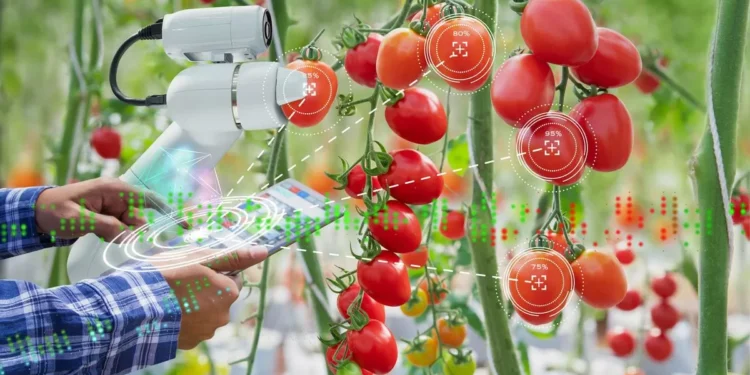In recent years, there has been a rapid growth in the field of Artificial Intelligence (AI) globally. Thanks to evolving technology and innovative minds, this advanced form of computing has become a game-changer in various sectors, including agriculture and healthcare in India. With its ability to analyze vast amounts of data, identify patterns, and make predictions, AI has revolutionized these sectors, making them more efficient, accessible, and contributing to the country’s economic growth.
Agriculture has been the backbone of India’s economy, with around 58% of the population depending on it for their livelihood. However, the sector has faced numerous challenges, including unpredictable weather conditions, lack of resources, inadequate infrastructure, and low productivity. This is where AI has stepped in, bringing hope and transforming the agriculture industry into a high-tech and efficient sector.
One of the key benefits of AI in agriculture is its ability to precisely predict weather patterns, helping farmers prepare and plan their crops accordingly. By analyzing various data sources such as satellite images, weather reports, and soil moisture levels, AI-assisted systems can provide real-time information about the weather, pest infestations, and crop diseases. This enables farmers to take preventive measures, reduce crop damage, and boost production.
Moreover, AI-powered drones equipped with high-resolution cameras can capture images of the farmlands, creating a detailed map of the entire area. This helps farmers identify specific areas that need attention, such as water or nutrient deficiency, and take corrective measures, thus improving crop yield. This technology has also proven to be cost-efficient, reducing the need for manual labor and minimizing the use of pesticides and fertilizers, resulting in higher profits for farmers.
In addition to weather prediction and monitoring, AI has also revolutionized the irrigation system in India’s agriculture. AI-powered sensors can monitor soil moisture levels, crop health, and water usage, providing farmers with real-time data and reducing water wastage. This is a significant step towards sustainable agriculture, addressing the water scarcity issue in the country.
Apart from transforming the traditional farming methods, AI has also opened up new opportunities in the agriculture sector, such as precision farming and robotic harvesting. Precision farming involves using AI-powered systems to analyze soil data, weather patterns, and other related data to optimize crop management. This not only improves crop yield but also reduces production costs and minimizes the environmental impact.
On the other hand, AI-powered robots are revolutionizing the harvesting process, making it more efficient and productive. These robots can identify ripe crops, pick and sort them, and even pack them, reducing reliance on manual labor and increasing speed and accuracy. With the rising demand for food and the shortage of labor in rural areas, this technology is a game-changer for the agriculture industry in India.
Apart from agriculture, AI has also made a significant impact in the healthcare sector in India. The country has been facing numerous challenges in this sector, including a shortage of doctors, poor infrastructure, and inadequate access to healthcare facilities in rural areas. To tackle these challenges, the Indian government has been focusing on the use of AI in healthcare, and the results have been impressive.
One of the most significant benefits of AI in healthcare is its ability to analyze vast amounts of patient data and identify patterns that can lead to early diagnosis and treatment of diseases. This not only saves lives but also reduces treatment costs and improves patient outcomes. AI-powered systems can also assist doctors in detecting diseases that are difficult to diagnose, such as cancer, by analyzing medical images and identifying abnormalities.
Moreover, AI has also brought significant advancements in telemedicine, making healthcare accessible to people in remote areas. With the help of AI-powered chatbots and virtual assistants, patients can consult doctors, seek medical advice, and even get prescriptions without physically visiting a doctor’s office. This has not only improved accessibility to healthcare but has also reduced the burden on hospitals and healthcare providers.
The use of AI in healthcare has also brought advancements in drug discovery and development. By analyzing vast amounts of data, AI-powered systems can identify interactions between drugs and diseases, discover new treatments, and predict potential side effects. This has revolutionized the pharmaceutical industry, reducing the time and cost of drug development and bringing new medicines to the market faster.
In addition to improving the efficiency and accessibility of healthcare, AI has also played a significant role in improving medical research and disease prevention. With its ability to process and analyze vast amounts of data, AI can identify potential epidemics, analyze genomes, and even predict the







